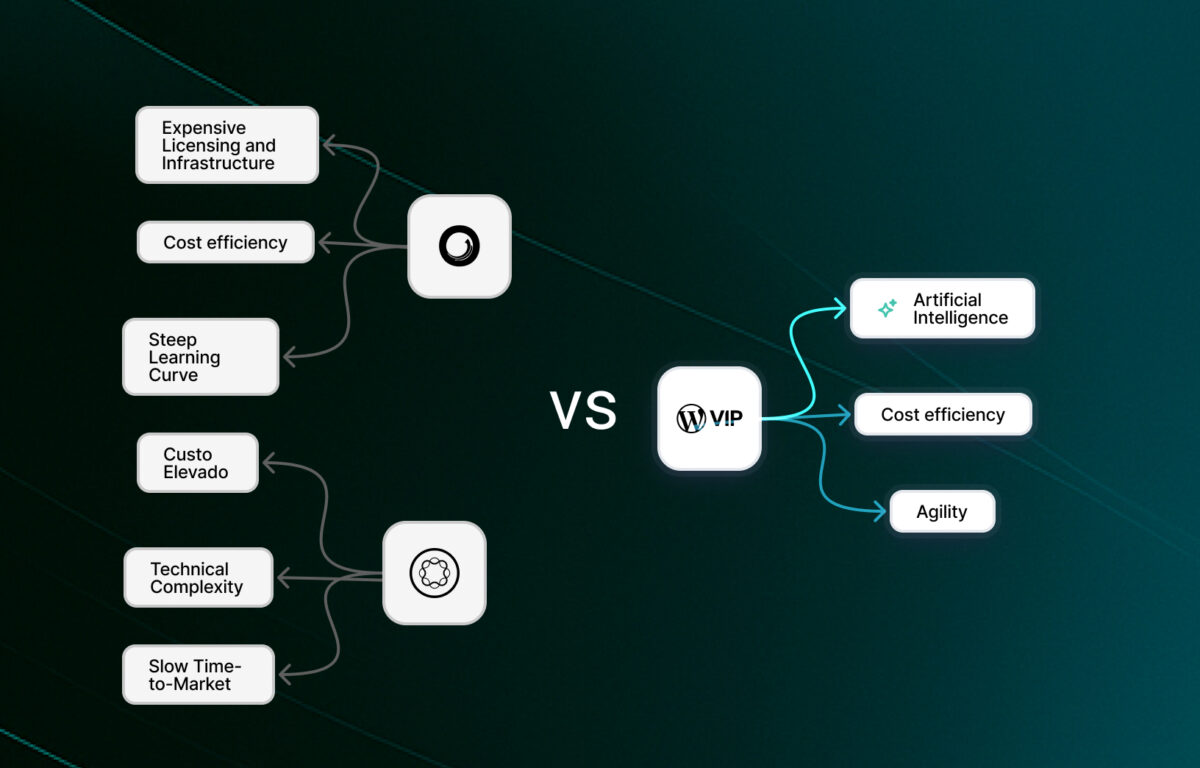The Cost of Tech Debt: What You’re Really Paying for With Legacy CMSes
Eddie Wise

When choosing a CMS, enterprise teams often focus on features and licensing fees. But the real cost lies in something harder to see: technical debt. That hidden backlog of complexity, outdated code, and integration bottlenecks can slow your business down, limit innovation, and quietly drain your budget.
In this post, we explore how legacy CMS platforms like Adobe Experience Manager (AEM) and Sitecore accumulate tech debt—and how modern alternatives like WordPress VIP help enterprises reduce risk and unlock agility.
What Is Technical Debt—and Why Does It Matter?
Technical debt refers to the extra effort needed to maintain or adapt systems due to outdated code, architecture decisions, or poorly integrated components. In CMS platforms, tech debt can show up as:
- Hard-to-update templates and themes
- Inflexible publishing workflows
- Custom integrations that break with every upgrade
- Legacy plugins or modules no one wants to touch
Why it matters:
This debt accumulates quietly—but it compounds over time, leading to slower time-to-market, missed opportunities, and rising maintenance costs.
Legacy CMSes: Debt by Design
Platforms like AEM and Sitecore were built in a different era—one that predates modern development workflows, composable architecture, and AI automation.
Sources of tech debt in legacy CMSes:
- Customizations that require hard-coded updates
- Monolithic architectures that resist modular design
- Poor support for CI/CD, Git workflows, or containerization
- Heavy reliance on niche developer talent for routine tasks
Result:
Each campaign launch, microsite, or A/B test becomes a mini engineering project—slowing down your team and increasing dependency on IT.
The Financial Cost of Falling Behind
Tech debt doesn’t just delay execution—it inflates your operating costs.
What you’re really paying for:
- Extra developer hours for tasks that should be simple
- Integration and upgrade delays that stall innovation
- Security patches and compliance fixes after the fact
- Licensing fees that don’t reflect actual productivity gains
In contrast, WordPress VIP reduces technical overhead with:
- A developer-friendly open-source core
- CI/CD support and GitHub-based workflows
- Centralized plugin vetting and automatic platform updates
- Pre-integrated analytics, personalization, and martech support
Business Risk and Compliance Exposure
Outdated systems create blind spots—especially in regulated industries. Without automated compliance logging or up-to-date security frameworks, tech debt becomes a liability, not just a nuisance.
Key risks include:
- Incomplete GDPR or HIPAA workflows
- Delayed vulnerability patches
- Poor documentation of who has access to what
- Difficult-to-audit third-party scripts or legacy features
WordPress VIP includes FedRAMP-level security, real-time monitoring, and built-in compliance tools—out of the box.
Future-Proofing: How to Eliminate Tech Debt for Good
You don’t fix tech debt by patching legacy systems—you fix it by rethinking your foundation. Future-proof CMS platforms like WordPress VIP help you:
- Launch faster with modern dev environments
- Empower non-technical teams to own content
- Integrate with any martech tool, CRM, or analytics stack
- Automate workflows and scale globally without extra infrastructure
You get fewer bugs. Fewer blockers. And more time to build what matters.

The Cost You Can’t See Will Cost You the Most
Tech debt is a silent tax on innovation. While legacy CMS vendors may offer enterprise “power,” the hidden complexity, high maintenance, and rigid architecture hold teams back.
WordPress VIP helps you cut through the clutter and operate with speed, confidence, and long-term clarity.
Future-Proofing Your Next CMS
Want a detailed comparison of the hidden costs between CMS platforms?



